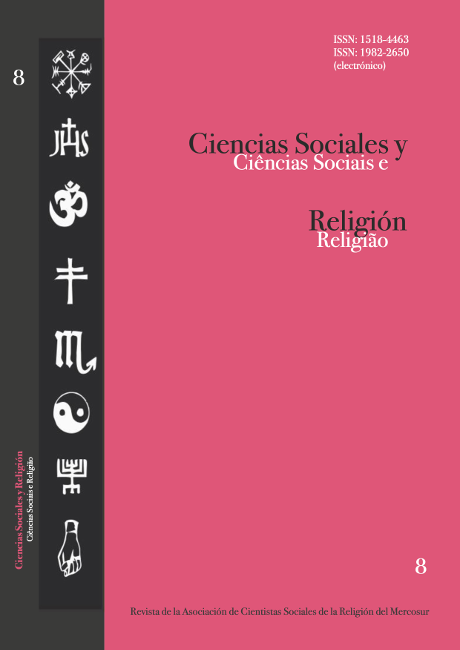Abstract
This article investigates the processes through which the dimensions ofpower, hierarchy and authority are constructed within a zen buddhist group locatedin Argentina. With this goal, we analize the figure of the “lineage of the patriarchs”of wich the zen master, being the last one of them, receives his authority, and therites that legitimate his position. Also, we present a series of conceptions thatdepict the master as a realized Buddha, in possesion of a great amount of vitalenergy or ki, that provides him with magical powers. This strenght is related to hiscapacity as ruler of the buddhist community, and to a revolutionary political attitudetowards the outside of the community. This takes us to the problem of the inclusionof zen buddhism in the framework of the New Age, as it presents aspects, such asa solid structure of authority, opposite to the ones commonly accepted featuresof this movement.
References
BAUMANN, Martin. Global Buddhism: Developmental Periods, Regional Histories and a New Analytical Perspective. Journal of Global Buddhism, n. 2 , p. 1-43, 2001.
BALANDIER, Georges. Antropología Política. Buenos Aires: Del Sol, 2004.
BESERMAN, Perle; STEGER, Mandfred. Nubes locas, Rebeldes del Zen. Buenos Aires: Estaciones, 1998.
BERGER, Peter. El Dosel Sagrado. Buenos Aires: Amorrutu, 1971.
BLOCH, Maurice. Prey into Hunter: The Politics of Religious Experience. Cambridge: Cambridge Univerity Press, 1992.
CARINI, Catón. Budismo local, budismo global: una recorrida por los grupos zen argentinos. REVER, año 5, n. 3, p. 178-195, 2005.
CAROZZI, Maria J. Nueva Era y Terapias Alternativas: Construyendo significados en el discurso y la interacción. Buenos Aires: EDUCA, 2000.
COLEMAN, James. The New Buddhism. New York: Oxford University Press, 2001.
DA ROCHA, Cristina. Being Zen-Buddhist in the Land of Catholicism. REVER, año 1, n. 1, p.57-72, 2001.
DA ROCHA, Cristina. Zen Buddhism in Brasil: Japanese or Brazilian? Journal of Global Buddhism. n. 1, p.31-55, 2000.
DESHIMARU, Taisen. El Zen de Dogen. Barcelona: Edicomunicaciones, 2002.
DESHIMARU, Taisen. El zen y las artes marciales. Barcelona: Humanitas, 1993.
DRAGONETTI, Carmen. Dhammapada: La Esencia de la Sabiduría Budista. Buenos Aires: Sudamericana, 1967.
ELIADE, Mircea. Yoga, Inmortalidad y Libertad. Buenos Aires: La Pleyade, 1988.
FREIBERGER, Oliver. The Meeting of Traditions: Inter-Buddhist and Inter- Religious Relations in the West. . Journal of Global Buddhism, n. 2, p. 59-71, 2001.
KONE, Alione. Zen in Europe: A Survey of the Territory. Journal of Global Buddhism, n. 2, p. 139-161, 2001.
LACHS, Stuart. Means of Autorization: Establishing Hierarchy in Ch ́an / Zen Buddhism in America. In: American Academy of Religion Meeting, 1999, Boston.
PEREIRA, Ronan. Religiôes Japonesas no Brasil: seu estudo e situaçâo atual. Newsletter de la Asociación de Cientistas Sociales de la Religión en el Mercosur, Buenos Aires, n. 14, p. 4-14, dic. 2002.
SHOJI, Rafael. Uma perspectiva analítica para os convertidos ao Budismo japonês no Brasil. REVER, año 2, n. 2, p.85-111, 2002.
SMITH, Harold. El Budismo. En: JAMES, E. O. (Dir.) Historia de las Religiones. Tomo II. Tercera edición. Barcelona: Vergara, 1963.
THIBAUT, Stéphane. Zen, la revolución interior. Buenos Aires: Troquel, 1996.
USARSKI, Frank. O Budismo no Brasil, um resumo sistemático. In: Usarsky, Frank (ed) O Budismo no Brasil, Saô Paulo: Lorosae, 2002, p. 9-33.

This work is licensed under a Creative Commons Attribution-NonCommercial-ShareAlike 4.0 International License.
Copyright (c) 2020 Catón Eduardo Carini
